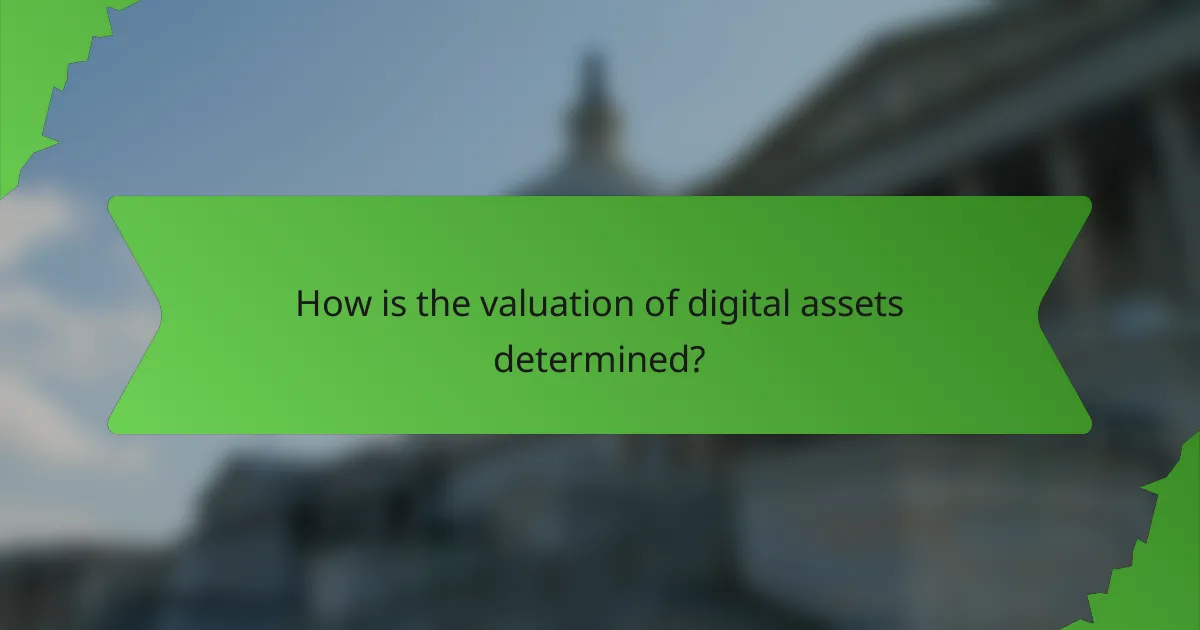Estate taxes on digital assets are taxes imposed on the value of digital property, such as cryptocurrencies, online accounts, and digital media, following an individual’s death. These assets are included in the estate and are subject to federal estate tax laws if their total value surpasses the exemption limit of $12.92 million for individuals in 2023. Accurate valuation of digital assets is crucial for tax purposes and can be complex due to market volatility and the diversity of asset types. Effective strategies for transferring digital assets include creating a digital estate plan, utilizing legal documentation, and designating beneficiaries, which are essential for managing potential tax liabilities and ensuring proper handling of these assets.

What are Estate Taxes on Digital Assets?
Estate taxes on digital assets are taxes levied on the value of digital property after an individual’s death. Digital assets include cryptocurrencies, online accounts, and digital media. The IRS treats these assets as part of the estate, subject to federal estate tax laws. The estate tax applies if the total value exceeds the exemption limit, which is $12.92 million for individuals in 2023. Executors must accurately value digital assets for tax purposes. This valuation can be complex due to market volatility and varying asset types. Proper planning is essential to manage potential tax liabilities effectively.
How are digital assets defined in the context of estate planning?
Digital assets in the context of estate planning are defined as online accounts, digital currencies, and electronic files that hold value. These assets include social media accounts, email accounts, digital photos, and cryptocurrencies. They can be transferred to heirs or beneficiaries through estate planning documents. Proper identification and valuation of digital assets are crucial for effective estate planning. According to the Uniform Law Commission, digital assets can be included in a will or trust. This ensures that the intended recipients can access and manage these assets after the owner’s death.
What types of digital assets are considered for estate taxes?
Digital assets subject to estate taxes include cryptocurrencies, online accounts, and digital media. Cryptocurrencies like Bitcoin and Ethereum are considered valuable assets. Online accounts encompass social media, email, and cloud storage services. Digital media includes music, e-books, and software licenses. These assets are evaluated based on their market value at the time of death. Proper documentation is essential for accurate valuation. Estate laws vary by jurisdiction, impacting how these assets are taxed.
How does the nature of digital assets impact their valuation?
The nature of digital assets significantly impacts their valuation. Digital assets are intangible and can vary widely in terms of ownership rights, market demand, and liquidity. Their valuation is influenced by factors such as scarcity, utility, and market trends. For example, cryptocurrencies have volatile prices driven by speculative trading and regulatory news. In contrast, digital collectibles may derive value from rarity and community interest. Additionally, the lack of standardized valuation methods complicates the assessment of digital assets. According to a report by Deloitte, the unique characteristics of digital assets necessitate tailored valuation approaches to reflect their distinctive market dynamics.
Why is planning for estate taxes on digital assets important?
Planning for estate taxes on digital assets is crucial to ensure proper management and transfer of these assets after death. Digital assets can include cryptocurrencies, online accounts, and digital files. Without a clear plan, heirs may face legal complications or loss of access. Estate taxes can significantly reduce the value of these assets if not addressed. According to the IRS, digital assets are subject to taxation like other property. Proper planning can help minimize tax liabilities and ensure a smooth transition. This is especially important as digital assets can appreciate in value over time.
What risks are associated with not planning for estate taxes on digital assets?
Not planning for estate taxes on digital assets can lead to significant financial losses. These losses may arise from unexpected tax liabilities upon the owner’s death. Digital assets, such as cryptocurrencies and online accounts, may not be easily transferable without proper planning. This can result in a delay in accessing or liquidating assets, leading to potential market depreciation. Additionally, heirs may face legal complications if digital assets are not clearly outlined in an estate plan. Failure to address these taxes may also lead to higher overall tax burdens due to lack of strategic gifting or trust arrangements. In 2021, the IRS reported that digital assets are increasingly scrutinized, indicating that unplanned estates may face audits or penalties. Proper planning can mitigate these risks and ensure a smoother transition of digital assets to heirs.
How can effective planning mitigate potential tax liabilities?
Effective planning can mitigate potential tax liabilities by strategically organizing assets and transactions. This involves assessing the value of digital assets accurately. Proper valuation can help minimize taxable gains. Additionally, utilizing tax-efficient transfer strategies can reduce estate tax burdens. Establishing trusts or gifting assets can also lower tax liabilities. According to the IRS, effective estate planning can save families significant amounts in taxes. By addressing these factors early, individuals can ensure compliance and optimize their tax situation.

How is the valuation of digital assets determined?
The valuation of digital assets is determined through various methods, including market comparison and income approaches. Market comparison involves analyzing recent sales of similar digital assets to establish a fair value. The income approach estimates future cash flows generated by the asset and discounts them to present value. Factors such as rarity, demand, and the asset’s utility also influence its valuation. For example, NFTs have unique attributes that can significantly affect their market value. Additionally, expert appraisals may be utilized to ensure accurate assessments. Digital assets can also be impacted by market volatility, which must be considered during valuation.
What methods are used to assess the value of digital assets?
Methods used to assess the value of digital assets include market comparison, income approach, and cost approach. Market comparison evaluates similar digital assets’ sale prices to determine value. The income approach estimates future income generated by the asset, then discounts it to present value. The cost approach assesses the cost to recreate the asset, factoring in depreciation. Each method provides a different perspective on value. According to a report by the International Journal of Digital Asset Management, these methods help establish a fair market value essential for estate planning.
How do market trends influence the valuation of digital assets?
Market trends significantly influence the valuation of digital assets. Fluctuations in demand and supply directly affect prices. For instance, a surge in interest from institutional investors can drive asset values higher. Conversely, negative news or regulatory changes can lead to sharp declines. Historical data shows that Bitcoin’s price rose from $1,000 in January 2017 to nearly $20,000 by December 2017 due to market enthusiasm. Similarly, trends in technology adoption, such as increased blockchain usage, can enhance the perceived value of digital assets. Overall, market trends serve as critical indicators for assessing the worth of digital assets in estate planning contexts.
What role do appraisals play in determining digital asset value?
Appraisals play a critical role in determining digital asset value. They provide a systematic method to evaluate the worth of digital assets. This evaluation considers factors such as market trends, the uniqueness of the asset, and potential revenue generation. Appraisals help establish a fair market value, which is essential for tax purposes and estate planning. Accurate appraisals can prevent disputes during asset transfers. Additionally, they assist in complying with legal requirements regarding asset valuation. The IRS often requires appraisals to substantiate reported values on tax returns. Thus, appraisals are vital for ensuring that digital assets are valued correctly in estate planning.
What factors affect the valuation process for digital assets?
The valuation process for digital assets is affected by several key factors. Market demand significantly influences the price of digital assets. The rarity of the asset also plays a crucial role; limited supply can drive up value. Ownership history impacts valuation; assets with a notable provenance may be valued higher. Regulatory environment affects valuation as legal clarity can enhance or diminish asset desirability. Technological advancements can alter asset functionality, impacting its market value. Economic conditions, such as inflation rates and market trends, also influence overall asset valuation. Lastly, the asset’s utility and usability in various applications can affect its perceived worth. Each of these factors collectively shapes the valuation landscape for digital assets.
How does ownership structure influence asset valuation?
Ownership structure significantly influences asset valuation. Different ownership structures, such as sole ownership, partnerships, or corporate entities, affect how assets are appraised. For instance, sole ownership may lead to a straightforward valuation based on market value. In contrast, partnerships might require a discount for lack of marketability.
Corporate ownership can introduce complexities like taxation and liability, impacting overall asset worth. Studies show that assets held in corporations often receive different valuations due to tax implications and operational risks.
Moreover, ownership structures can dictate control and liquidity, which are critical factors in valuation. For example, minority interests in a partnership typically have lower valuations due to limited control and marketability.
In summary, the ownership structure directly affects how assets are valued by influencing factors like marketability, control, and tax implications.
What are the challenges in valuing unique digital assets?
Valuing unique digital assets presents several challenges. One major challenge is the lack of standardized valuation methodologies. Unlike physical assets, digital assets can vary significantly in their market demand and perceived value. Furthermore, the volatility of digital asset markets complicates consistent valuation. The uniqueness of each digital asset, such as NFTs, adds to the difficulty in establishing a comparable market value. Additionally, legal and regulatory uncertainties surrounding digital assets can impact their valuation. For example, varying interpretations of copyright and ownership rights can lead to discrepancies in asset worth. Finally, the rapid evolution of technology can render certain digital assets obsolete, affecting their long-term value.

What are effective transfer strategies for digital assets?
Effective transfer strategies for digital assets include creating a digital estate plan, using legal documentation, and designating beneficiaries. A digital estate plan outlines how digital assets will be managed and transferred after death. Legal documentation, such as wills or trusts, should explicitly mention digital assets to ensure proper handling. Designating beneficiaries for digital accounts can simplify the transfer process. Additionally, utilizing password managers can help secure access to digital assets. According to a survey by Caring.com, only 32% of Americans have a will, highlighting the importance of addressing digital assets in estate planning.
How can digital assets be transferred to heirs or beneficiaries?
Digital assets can be transferred to heirs or beneficiaries through various methods. One common method is to include digital assets in a will or estate plan. This ensures that the assets are legally recognized and can be distributed according to the deceased’s wishes.
Another method is to use a digital asset management service. These services can store access information and facilitate the transfer of assets after death. Additionally, some digital platforms allow users to designate beneficiaries directly within their account settings.
It is important to inform heirs about the existence of digital assets. This can be achieved by maintaining a comprehensive inventory of all digital assets and their associated access information.
Legal requirements may vary by jurisdiction, so consulting with an estate planning attorney is advisable. This ensures compliance with local laws regarding digital asset transfer.
What legal considerations must be addressed during asset transfer?
Legal considerations during asset transfer include compliance with applicable laws and regulations. Proper documentation is essential to establish ownership and facilitate the transfer. Tax implications must be evaluated to avoid unexpected liabilities. Consent from all parties involved is necessary to ensure a valid transfer. Additionally, any restrictions on the asset’s transfer must be identified and respected. Legal advice may be required to navigate complex situations. Estate planning documents should be reviewed to align with the transfer. Finally, the implications of digital asset management laws must be considered, as they can vary by jurisdiction.
How can trusts be utilized in the transfer of digital assets?
Trusts can be utilized in the transfer of digital assets by providing a legal framework for managing and distributing these assets. A trust allows the creator to specify how digital assets should be handled after their death. This can include instructions for accessing, managing, and transferring the assets to beneficiaries. Trusts can help avoid probate, which can be time-consuming and public. They also provide privacy regarding the distribution of assets. Furthermore, trusts can ensure that digital assets are managed according to the creator’s wishes. This is particularly important for assets like cryptocurrency or online accounts, which may have specific access requirements. By establishing a trust, individuals can safeguard their digital legacy effectively.
What common pitfalls should be avoided in transferring digital assets?
Common pitfalls to avoid in transferring digital assets include failing to document assets accurately. Lack of clear documentation can lead to disputes among heirs. Another pitfall is neglecting to update account access information. This can result in beneficiaries being unable to access the assets. Additionally, overlooking the legal implications of digital asset transfer is critical. Many jurisdictions have specific laws governing digital inheritance. Failing to comply with these laws can complicate the transfer process. Another common mistake is not considering tax implications. Proper planning can minimize estate taxes on digital assets. Lastly, ignoring security measures during the transfer can lead to asset loss. Ensuring secure transfer methods protects the integrity of the assets.
How can proper documentation prevent disputes during asset transfer?
Proper documentation can prevent disputes during asset transfer by providing clear evidence of ownership and terms. It establishes a legal record of the transaction. This record includes details about the assets involved, the parties, and the agreed-upon conditions. Accurate documentation reduces ambiguity and misinterpretation. For example, a well-drafted contract outlines each party’s rights and obligations. This clarity minimizes the potential for disagreements. Additionally, documentation serves as a reference point in case of disputes. Courts often rely on written records to resolve conflicts. Inconsistent or missing documentation can lead to challenges and legal complications. Therefore, comprehensive documentation is essential for a smooth asset transfer process.
What strategies can ensure a smooth transition of digital assets?
To ensure a smooth transition of digital assets, implement clear planning strategies. Establish a comprehensive digital inventory that includes all assets and access details. Designate a trusted individual or executor responsible for managing these assets. Utilize legal documents such as wills or trusts to specify the distribution of digital assets. Regularly update your digital inventory and beneficiary designations to reflect changes. Educate your beneficiaries on how to access and manage these assets. Consider using digital asset management tools for organization and security. These strategies help mitigate complications during the transfer process, ensuring that digital assets are handled according to your wishes.
What best practices should be followed for planning estate taxes on digital assets?
Identify and document all digital assets. This includes cryptocurrencies, online accounts, and digital files. Establish the value of each digital asset accurately. Use current market values for cryptocurrencies and assess other digital assets based on their potential worth. Create a comprehensive inventory of these assets. This inventory should be included in your estate plan. Designate a digital executor to manage these assets after your passing. Ensure this person has the necessary access and knowledge. Include clear instructions for accessing digital assets in your estate documents. This can prevent disputes and confusion among heirs. Regularly update your estate plan to reflect changes in digital assets. This is important as the digital landscape evolves. Consult with a tax professional to understand the implications of estate taxes on digital assets. This can help in minimizing tax liabilities and ensuring compliance.
How can individuals prepare for potential digital asset taxation?
Individuals can prepare for potential digital asset taxation by keeping detailed records of their digital assets. This includes documenting the purchase price, transaction history, and current market value. Regularly updating this information helps in accurately reporting gains or losses. Consulting with a tax professional is advisable to understand specific tax implications. Staying informed about tax regulations related to digital assets is crucial, as laws can change. Utilizing tax software can also assist in tracking and reporting digital asset transactions effectively. Engaging in proactive tax planning can minimize liabilities and ensure compliance.
What resources are available for effective estate planning of digital assets?
Resources for effective estate planning of digital assets include legal guides, software tools, and professional services. Legal guides provide insights into laws governing digital assets. Software tools assist in organizing and managing digital information. Professional services, such as estate planners and attorneys, offer personalized advice. The American Bar Association provides resources on digital estate planning. Websites like Everplans and Trust & Will offer templates and tools. Additionally, the Digital Legacy Association focuses on best practices for managing digital assets after death. These resources help ensure comprehensive planning for digital assets.
The main entity of the article is estate taxes on digital assets, which encompass cryptocurrencies, online accounts, and digital media. The article provides a detailed overview of how these assets are valued and the implications of estate taxes following an individual’s death. It covers the definition of digital assets in estate planning, the complexities of their valuation, and the importance of effective planning to minimize tax liabilities. Additionally, the article discusses various transfer strategies, legal considerations, and best practices for managing digital assets to ensure a smooth transition to heirs or beneficiaries.




